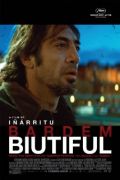
Directed by
Alejandro González Iñárritu
148 minutes
Rated MA
Reviewed by
Sharon Hurst

Biutiful
Much like Jean Pierre and Luc Dardenne's 1996 film, The Promise, which looked at the modern real world blight of trafficking in illegal immigrants in Belgium, Alejandro Iñárritu’s Buitiful focuses on single individual, Uxbal (Javier Bardem), who lives on the fringes of Barcelona society making a scant living organizing illegal African and Chinese immigrant labour for sweatshops and building sites and his awakening sense of morality as his life unravels around him.
Whilst the Dardennes’ film was closer to the social realist end of the spectrum and more of a single issue film Iñárritu’s take on the matter has a dramatically more complex and gut-wrenching scenario. Uxbal’s estranged wife, Marambra (Maricel Alvarez) suffers from bipolar disorder and when he discovers that he is terminally ill and tries to rehabilitate his life by leaving a legacy of something positive behind him especially for his two young children, daughter Ana, (Hanaa Bouchaib) and son, Matteo (Guillermo Estrella), he is so ingrained in his dodgy ways that even these good intentions reap tragic results and there is little of the optimism that tends to mark the social realist film.
Bardem gives a marvellous performance, at once tender and stoical, with Iñárritu keeping closely focused on his rough-hewn unshaven features and with the help of cinematographer Rodrigo Prieto keeping us largely locked within a grimy underworld from which the only escape is death. Indeed all the characters are presented with the same kind of inescapable sweaty closeness.
Arguably Iñárritu over-indulges in the grimness and the Oscar-nominated film could have been shortened to better effect particularly in the latter stages when the narrative gets unduly drawn out as it resolves each character’s story and the film repeats an opening imaginary sequence which is presumably meant to provide Uxbal with some kind of redemptive relief to his sorry life.
DVD Extras: Behind Biutiful - Director's flip notes ; Cast Interviews; Biutiful Crew
Available from: Madman
Want something different?





